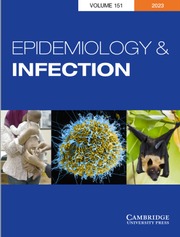Crossref Citations
This article has been cited by the following publications. This list is generated based on data provided by
Crossref.
Potter, C.W.
Shedden, W.I.H.
and
Zachary, R.B.
1963.
A comparative study of the incidence of adenovirus antibodies in children with intussusception with that in a control group.
The Journal of Pediatrics,
Vol. 63,
Issue. 3,
p.
420.
SHEDDEN, W. I. H.
and
POTTER, C. W.
1964.
Comparative Susceptibility to Adenovirus Infection of Children of Blood Groups A and O.
Nature,
Vol. 202,
Issue. 4931,
p.
505.
Potter, C.W.
and
Zachary, R.B.
1964.
The Etiology of Intussusception: With Particular Attention to the Adenovirus Infections.
Surgical Clinics of North America,
Vol. 44,
Issue. 6,
p.
1509.
Potter, C. W.
1964.
Adenovirus infection as an aetiological factor in intussusception of infants and young children.
The Journal of Pathology and Bacteriology,
Vol. 88,
Issue. 1,
p.
263.
Lippelt, H.
and
Schulze, W.
1966.
Epidemiologische Untersuchungen über Adeno-Infektionen.
Zeitschrift für Medizinische Mikrobiologie und Immunologie,
Vol. 152,
Issue. 3,
p.
238.
Potter, C. W.
and
Schild, G. C.
1966.
Antibody levels in human sera to oncogenic adenoviruses (types 7, 12 and 18).
Archiv f�r die gesamte Virusforschung,
Vol. 18,
Issue. 1,
p.
80.
HORNSLETH, ALLAN
1967.
RESPIRATORY VIRUS DISEASE IN INFANCY AND CHILDHOOD IN COPENHAGEN 1963‐65.
Acta Pathologica Microbiologica Scandinavica,
Vol. 69,
Issue. 2,
p.
287.
Candeias, José Alberto Neves
1968.
Anticorpos fixadores de complemento para o vírus respiratório sincicial e adenovírus e inibidores da hemaglutinação para os vírus parainfluenza 1, 2 e 3 numa população infantil brasileira.
Revista de Saúde Pública,
Vol. 2,
Issue. 1,
p.
44.
Solisch, P.
Kewitsch, A.
and
Kretschmer, B.
1968.
Inapparente adenovirusinfektionen bei kindern und erwachsenen (Otorhinolaryngologische beobachtungen im raum rostock).
Archiv f�r Klinische und Experimentelle Ohren- Nasen- und Kehlkopfheilkunde,
Vol. 190,
Issue. 2,
p.
203.
Jennings, Roy
1972.
Adenovirus, parainfluenza virus and respiratory syncytial virus antibodies in the sera of Jamaicans.
Journal of Hygiene,
Vol. 70,
Issue. 3,
p.
523.
Sutton, R.N.P.
Pullen, HazelJ.M.
Blackledge, P.
Brown, E.H.
Sinclair, L.
and
Swift, P.N.
1976.
ADENOVIRUS TYPE 7; 1971-74.
The Lancet,
Vol. 308,
Issue. 7993,
p.
987.
Meurman, Olli Henrik
Sarkkinen, Hannu Kalevi
Puhakka, Heikki Juhani
Virolainen, Erkki Simo
and
Meurman, Otto Henrik
1980.
Local IgA‐Class antibodies against respiratory viruses in middle ear and nasopharyngeal secretions of children with secretory otitis media.
The Laryngoscope,
Vol. 90,
Issue. 2,
p.
304.
D'ambrosio, E.
Grosso, N. Del
Chicca, A.
and
Midulla, M.
1982.
Neutralizing antibodies against 33 human adenoviruses in normal children in Rome.
Journal of Hygiene,
Vol. 89,
Issue. 1,
p.
155.
Potter, C. W.
and
Rees, R. C.
1985.
Immunological Aspects of Cancer.
p.
207.
Sanchez, Jose L.
Binn, Leonard N.
Innis, Bruce L.
Reynolds, Richard D.
Lee, Terrence
Mitchell‐Raymundo, Felicia
Craig, Stephen C.
Marquez, Jeffrey P.
Shepherd, Greg A.
Polyak, Christina S.
Conolly, Johnnie
and
Kohlhase, Kimmie F.
2001.
Epidemic of adenovirus‐induced respiratory illness among US military recruits: Epidemiologic and immunologic risk factors in healthy, young adults*†.
Journal of Medical Virology,
Vol. 65,
Issue. 4,
p.
710.
Kolavic‐Gray, Shellie A.
Binn, Leonard N.
Sanchez, Jose L.
Cersovsky, Steven B.
Polyak, Christina S.
Mitchell‐Raymundo, Felicia
Asher, Ludmila V.
Vaughn, David W.
Feighner, Brian H.
and
Innis, Bruce L.
2002.
Large Epidemic of Adenovirus Type 4 Infection among Military Trainees: Epidemiological, Clinical, and Laboratory Studies.
Clinical Infectious Diseases,
Vol. 35,
Issue. 7,
p.
808.
Metzgar, David
Osuna, Miguel
Yingst, Samuel
Rakha, Magda
Earhart, Kenneth
Elyan, Diaa
Esmat, Hala
Saad, Magdi D.
Kajon, Adriana
Wu, Jianguo
Gray, Gregory C.
Ryan, Margaret A. K.
and
Russell, Kevin L.
2005.
PCR Analysis of Egyptian Respiratory Adenovirus Isolates, Including Identification of Species, Serotypes, and Coinfections.
Journal of Clinical Microbiology,
Vol. 43,
Issue. 11,
p.
5743.
Belsy, Acosta
Odalys, Valdés
Alexander, Piñón
Clara, Savón
Angel, Goyenechea
Grehete, Gonzalez
Guelsys, Gonzalez
Luis, Sarmiento
Pedro, Más
Guadalupe, Guzmán María
Alina, Llop
Pilar, Perez Breña Ma
and
Inmaculada, Casas
2009.
Molecular characterization of adenoviral infections in Cuba: report of an unusual association of species D adenoviruses with different clinical syndromes.
Archives of Virology,
Vol. 154,
Issue. 4,
p.
619.
Houng, Huo-Shu H.
Lott, Lisa
Gong, Heping
Kuschner, Robert A.
Lynch, Julia A.
and
Metzgar, David
2009.
Adenovirus Microsatellite Reveals Dynamics of Transmission during a Recent Epidemic of Human Adenovirus Serotype 14 Infection.
Journal of Clinical Microbiology,
Vol. 47,
Issue. 7,
p.
2243.
Metzgar, David
Gibbins, Carl
Hudson, N. Ryan
and
Jones, Morris S.
2010.
Evaluation of Multiplex Type-Specific Real-Time PCR Assays Using the LightCycler and Joint Biological Agent Identification and Diagnostic System Platforms for Detection and Quantitation of Adult Human Respiratory Adenoviruses.
Journal of Clinical Microbiology,
Vol. 48,
Issue. 4,
p.
1397.


